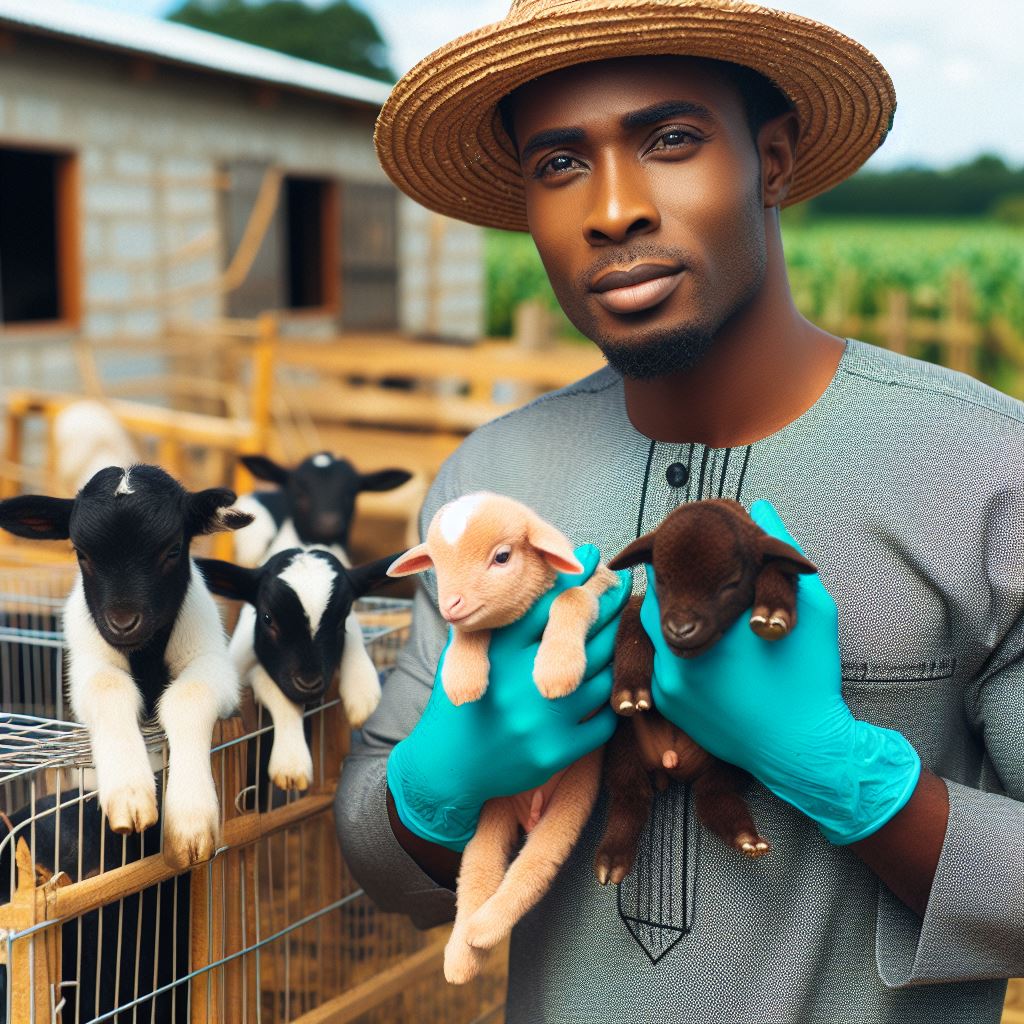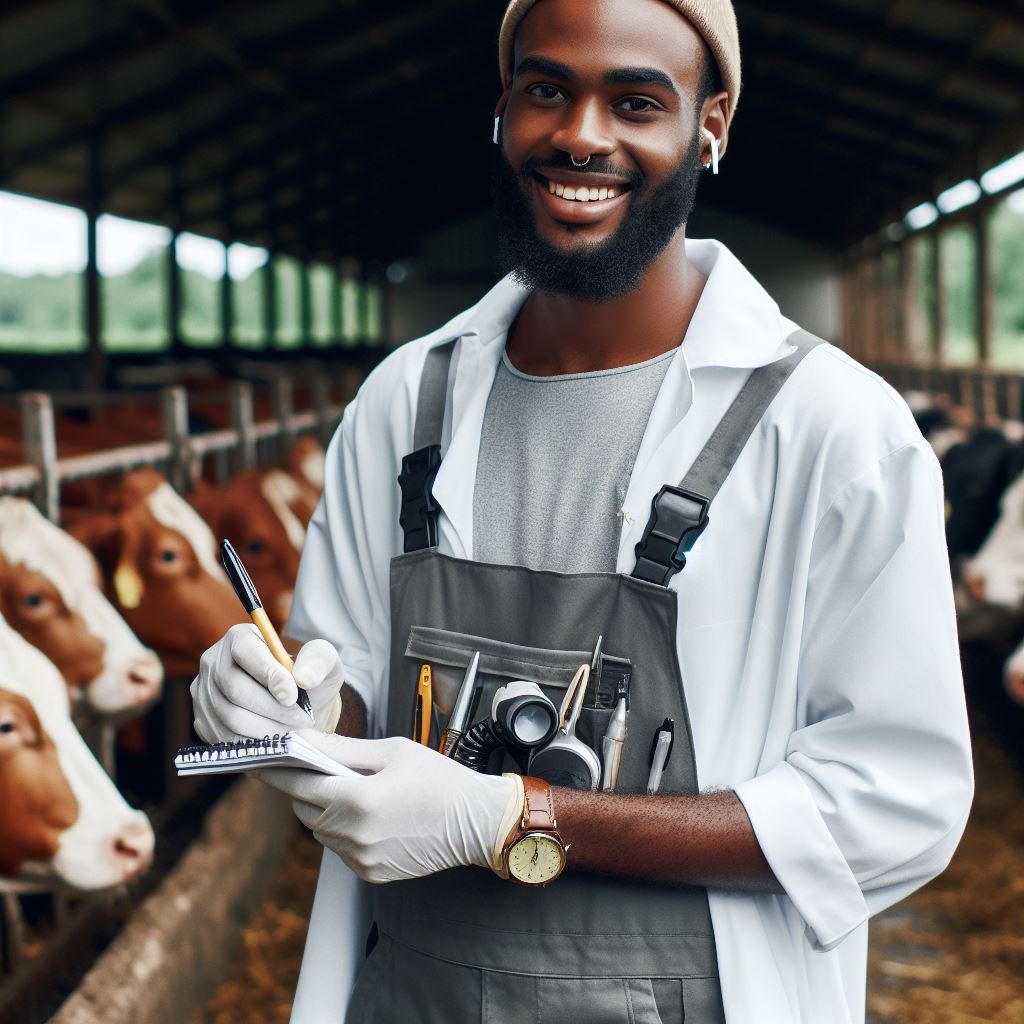Introduction
Animal science education plays a crucial role in Nigeria, contributing to its economic growth and food security.
Nigeria’s climate is characterized by high temperatures, distinct dry and rainy seasons, and varying levels of humidity.
This post examines the impact of Nigeria’s climate on animal science education and highlights the challenges it poses.
Nigeria’s climate is tropical, with an average temperature ranging from 25 to 35 degrees Celsius.
The country experiences two main seasons: the dry season, which lasts from November to March, and the rainy season, which occurs from April to October.
The northern region of the country is relatively drier compared to the south. The humidity levels vary across different regions of Nigeria.
Nigeria’s climate poses several challenges to animal science education in the country.
The high temperatures and dryness during the dry season limit the availability of water and forage, affecting livestock production.
This can hinder practical learning opportunities for students in animal science programs.
Additionally, the varying humidity levels and temperature fluctuations can lead to the spread of diseases among livestock, which further affects the learning and research activities in animal science education.
Students and educators need to adapt their approaches to address climate-related issues and find innovative solutions to mitigate the impact on animal agriculture.
Nigeria’s climate has a significant impact on animal science education in the country.
The challenges posed by high temperatures, dry seasons, limited water and forage availability, and disease outbreaks require proactive measures to ensure effective education and research in animal science.
By developing strategies to overcome these challenges, Nigeria can strengthen its animal science education system and contribute to sustainable and resilient livestock production.
Read: Top Universities in Nigeria Offering Animal Nutrition Courses
Climate and Animal Health
When it comes to animal science education in Nigeria, the impact of the country’s climate on animal health cannot be ignored.
Nigeria’s tropical climate poses unique challenges for both animal science students and professionals in maintaining the well-being of animals.
The Relationship between Climate and Animal Health
Climate plays a vital role in the health and productivity of animals.
The specific characteristics of Nigeria’s tropical climate have a direct impact on the overall well-being of animals in the region.
- High Temperatures: Nigeria’s climate is characterized by high temperatures, especially in the northern regions. These extreme temperatures can lead to heat stress in animals, causing reduced feed intake, decreased milk production, and even death in severe cases.
- Humidity Levels: Alongside high temperatures, Nigeria experiences high humidity levels. Humidity affects animals’ ability to dissipate heat through sweating or panting, further exacerbating the heat stress problem.
- Parasitic Infections: Nigeria’s tropical climate provides a favorable environment for the proliferation of various parasites. Animals are more susceptible to infections such as ticks, fleas, mosquitoes, and worms, leading to reduced productivity and increased health issues.
Effects of Nigeria’s Tropical Climate on Animal Health
The adverse effects of Nigeria’s climate on animal health are far-reaching and can significantly impact the agricultural industry and animal science education in the country.
- Reduced Productivity: Heat stress and parasitic infections can lead to reduced productivity in animals. Lower milk production, weight loss, and decreased fertility rates all contribute to economic losses for farmers and challenges for animal science professionals seeking to improve animal health.
- Disease Outbreaks: High humidity levels and the presence of parasites create an environment that fosters disease outbreaks. Animals may be more susceptible to infections like foot-and-mouth disease, trypanosomiasis, and avian influenza, among others. These diseases pose risks not only to animal health but also to public health and food security.
Challenges Faced by Animal Science Students and Professionals in Maintaining Animal Health in Nigeria’s Climate
- Limited Resources: Animal science students and professionals in Nigeria often face resource constraints when it comes to combating climate-related animal health challenges. Access to advanced veterinary equipment, high-quality animal feed, and appropriate medications can be limited, hindering efforts to maintain animal health.
- Lack of Research: The impact of Nigeria’s climate on animal health is an area that requires further research. Limited studies and data on specific climate-related health challenges make it difficult for animal science professionals to develop effective prevention and treatment strategies.
- Education and Training Gaps: Animal science education programs in Nigeria need to adapt to the unique challenges posed by the country’s climate. Integrating climate-related topics into the curriculum, providing practical training on animal health management in tropical climates, and fostering research opportunities can better prepare students and professionals.
In short, Nigeria’s tropical climate presents significant challenges for animal health in the country.
Temperature extremes, high humidity, and increased parasite activity create an environment that can negatively impact animal well-being and productivity.
Addressing these challenges requires adequate resources, further research, and tailored education and training programs for animal science students and professionals.
Read: Field Trips & Practical Experiences in Nigerian Animal Science

Climate and Livestock Production
When it comes to animal science education in Nigeria, the impact of the country’s climate cannot be ignored.
Nigeria’s climate plays a crucial role in shaping livestock production practices, and as a result, it presents both opportunities and challenges for animal science students and professionals.
Relationship between climate and livestock production
The climate in Nigeria has a significant influence on livestock production. Livestock, such as cattle, goats, and poultry, are highly susceptible to changes in temperature, rainfall patterns, and humidity.
These climate factors directly impact their growth, reproduction, and overall well-being.
In regions with a more favorable climate, livestock production tends to flourish. Areas with abundant rainfall and moderate temperatures provide ideal conditions for raising livestock.
On the other hand, regions with extreme weather conditions, such as prolonged droughts or heavy rainfall, present challenges to sustainable livestock production.
Challenges faced by animal science students and professionals in sustainable livestock production in Nigeria
Animal science students and professionals in Nigeria face various challenges in their efforts to promote sustainable livestock production.
- Inadequate infrastructure: The lack of proper infrastructure, such as well-maintained barns, storage facilities, and processing plants, hinders efficient livestock production.
- Poor access to veterinary services: Limited access to veterinary services and lack of skilled professionals hinder disease prevention and treatment.
- Inadequate funding: Insufficient financial resources allocated to animal science research and development limit advancements in livestock production.
- Climate change: As climate change continues to worsen, unpredictable weather patterns pose challenges to the maintenance and growth of livestock populations.
- Insufficient training and education: Inadequate training and education on sustainable livestock production practices limit the ability of professionals to adapt to changing climate conditions.
Effects of Nigeria’s climate on livestock feeding, reproduction, and growth
The specific effects of Nigeria’s climate on livestock feeding, reproduction, and growth are significant and must be considered in animal science education.
- Livestock feeding: Nigeria’s climate affects the availability and quality of forage for livestock. During periods of drought, vegetation becomes scarce, resulting in inadequate feed resources. This can lead to malnutrition and hinder the growth and health of the animals.
- Livestock reproduction: Extreme weather conditions can disrupt the reproductive cycles of livestock. Heat stress caused by high temperatures can negatively impact reproductive performance, leading to decreased fertility rates and reduced offspring production.
- Livestock growth: The growth of livestock is influenced by climate factors such as temperature and rainfall. Extreme temperatures can affect the animals’ metabolic processes and cause reduced growth rates. Additionally, excessive rainfall can create muddy and unhygienic conditions, increasing the risk of diseases and inhibiting growth.
Basically, Nigeria’s climate has a profound impact on animal science education and livestock production.
While it presents challenges, such as inadequate infrastructure and poor access to veterinary services, it also offers opportunities for innovation and adaptation.
By addressing these challenges and equipping students and professionals with the necessary skills and knowledge, Nigeria can strive towards sustainable and resilient livestock production.
Read: Career Prospects: Graduating in Animal Nutrition from Nigeria
See Related Content: International Collaboration in Wildlife Management in Nigeria
Climate Change and Animal Science Education
Climate change is significantly impacting animal science education in Nigeria. The changing climate is not only affecting the curriculum but also altering teaching methodologies.
In order to mitigate these challenges, adaptation strategies have been implemented.
Impact of Climate Change on Animal Science Education in Nigeria
- Rising temperatures and extreme weather events have led to changes in livestock production.
- Increased heat stress negatively affects the performance and productivity of animals.
- Changes in rainfall patterns lead to water scarcity, which affects animal health and production.
- Changing climate affects the availability and quality of forage, leading to nutritional deficiencies in livestock.
How Climate Change Affects Curriculum and Teaching Methodologies
Climate change has prompted the inclusion of new topics and approaches in animal science education:
Transform Your Career with Expert Guidance
Get personalized mentorship consulting that’s tailored to your unique path. Our expert advice is actionable and exclusive.
Get Started- Integration of climate change science into the curriculum to enhance students’ understanding of its impacts on livestock.
- Teaching methodologies focusing on climate-resilient livestock production systems.
- Promotion of sustainable and climate-smart agricultural practices in animal science education.
- Emphasizing the importance of adaptation and mitigation strategies to address climate change challenges.
Furthermore, climate change has influenced the practical aspects of animal science education:
- Students are exposed to real-life scenarios of climate-related challenges faced by farmers.
- Field trips and visits to climate-resilient livestock farms are integrated into the curriculum.
- Hands-on experiences in managing animal health, nutrition, and production in changing climatic conditions.
Adaptation Strategies Used in Animal Science Education to Address Climate Change
To ensure effective animal science education in the face of climate change, the following strategies have been adopted:
- Development of climate change-focused research and innovation in animal science education.
- Collaboration with farmers, agricultural extension services, and other stakeholders to share experiences and knowledge.
- Promotion of climate-resilient livestock breeds that are adaptable to changing environmental conditions.
- Integration of climate change adaptation and mitigation measures into animal healthcare and nutrition practices.
- Training programs and workshops for educators to enhance their understanding of climate change impacts and teaching approaches.
Essentially, climate change is profoundly impacting animal science education in Nigeria.
The curriculum and teaching methodologies have been adjusted to address these challenges, and adaptation strategies have been implemented.
Through these efforts, animal science education is equipping students to understand and mitigate the impacts of climate change on livestock production and effectively contribute to sustainable agricultural practices.
Read: Postgraduate Opportunities in Animal Science in Nigeria
Conclusion
This blog post has highlighted the important relationship between Nigeria’s climate and animal science education.
Understanding Nigeria’s climate is crucial for effective animal science education to ensure climate resilience.
Stakeholders must prioritize climate resilience in animal science education in Nigeria for a sustainable future.




